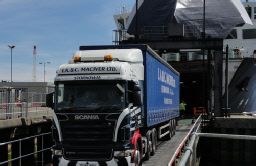The Western Isles economy will be badly hit unless ferries can cope with a predicted increase in traffic, warns Comhairle nan Eilean Siar.
Sea routes across the Minch are vital economic links for the Outer Hebrides with essential supplies, building and industrial materials as well as tourists arriving by ferry.
Every household and business depends on a regular sea transport service for incoming goods and foodstuffs while hundreds of jobs in the Harris Tweed, salmon, shellfish industry would be lost without it.
Recently, the council’s technical and transport services director Iain Mackinnon
warned that the new MV Loch Seaforth could experience increased traffic from “pent-
In addition, levels of haulage, goods and passengers are expected to rise on the island sea routes especially through the Stornoway to Ullapool run in the coming years.
Councillors warn that the new Stornoway ferry service is not future-
This summer replicates the experience of last season -
The Tarbert ferry is working at capacity on weekends when holiday cottages have their changeover tenants all at the same time..
Constrained space and the absence of additional sailings also badly hits islanders as they find it difficult to get to the mainland at short notice.
The council is undertaking a study to provide Transport Scotland with “robust evidence” over each ferry service in the Western Isles.
The Outer Hebrides Tourism Industry Association (OHTIA) says more sailings should be timetabled.
The body urges an improved booking system, maintaining many would-
However, Cal Mac does not kept records of how many travellers are knocked-
Western Isles Council’s transport chief John Mackay said the a multi-
The research will examine each ferry and particularly look at the “current capacity constraints affecting the Western Isles and (affecting) the potential for growth across all sectors in the islands.”
Writing to the transport minister, Mr Mackay stressed: “Transport Scotland and CalMac are simply not understanding the views and concerns of the communities served by these lifeline ferry services.”
